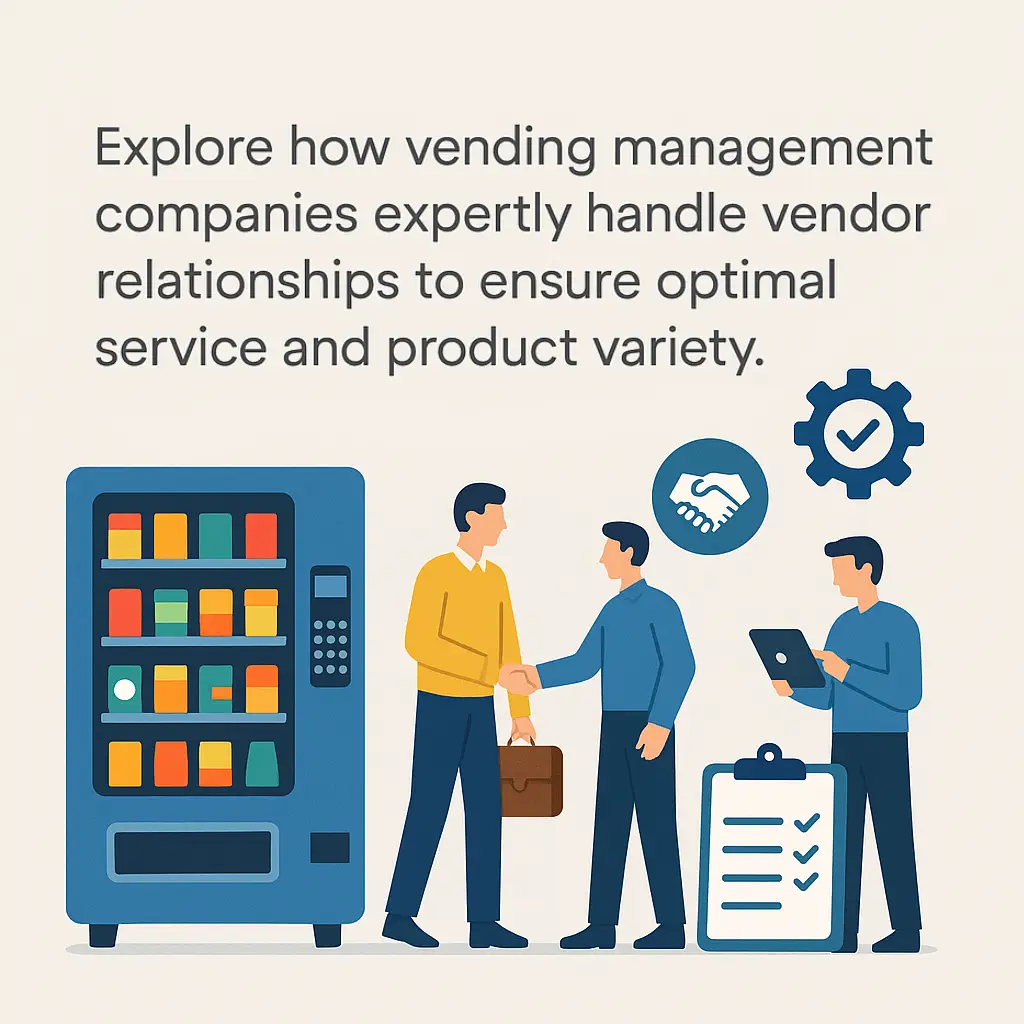Vendor Relationship Management in Vending Services
Explore how vending management companies expertly handle vendor relationships to ensure optimal service and product variety.
Back to Vending Management Companies ResourcesExplore how vending management companies expertly handle vendor relationships to ensure optimal service and product variety.
Back to Vending Management Companies ResourcesEffective Vendor Relationship Management is the cornerstone of a seamless and profitable vending operation, ensuring quality, reliability, and customer satisfaction.
![]() Strategic vendor selection based on performance and service
Strategic vendor selection based on performance and service
![]() Clear Service Level Agreements for accountability and quality
Clear Service Level Agreements for accountability and quality
![]() Proactive communication to resolve issues and optimize offerings
Proactive communication to resolve issues and optimize offerings

In the dynamic world of vending services, the quality of your vendor relationships directly impacts customer satisfaction, operational efficiency, and ultimately, your bottom line. Vendor Relationship Management (VRM) is not just about finding a vendor; it's about cultivating a strategic partnership that ensures your vending machines are consistently stocked, well-maintained, and offering products consumers desire.
A robust VRM strategy begins with meticulous vendor selection. This involves more than just price comparison; it requires a deep dive into a vendor's reliability, service history, product range, technological capabilities, and their ability to adhere to agreed-upon Service Level Agreements (SLAs). Vending management companies, for instance, excel at this by having established networks of vetted providers. To understand this process better, explore how vending management companies select vendors.
Once a vendor is chosen, clear communication and well-defined contracts are paramount. Service Level Agreements should outline expectations for restocking frequency, maintenance response times, cleanliness standards, and product quality. Regular performance reviews are critical to ensure these standards are consistently met. This proactive approach helps in addressing issues before they escalate, maintaining optimal machine uptime and user experience. An in-depth look at this can be found in Vending Management Service Level Agreements Explained.
For businesses with multiple locations, centralized VRM offers significant advantages. It streamlines operations, ensures brand consistency, and leverages purchasing power for better terms and diversified offerings. This is particularly beneficial for large corporations or institutions seeking a unified vending experience across all their sites. Learn more about the benefits of a centralized approach by reading Why Corporate Offices Use Vending Management Companies.
Leveraging technology is another key aspect of modern VRM. Remote monitoring systems allow for real-time tracking of inventory, sales data, and machine status, enabling predictive stocking and swift maintenance dispatch. This data-driven approach means fewer empty machines, fewer customer complaints, and a more efficient vending operation overall. Ultimately, effective vendor relationship management transforms vending services from a simple amenity into a strategic asset that supports your business goals.
VRM in vending services refers to the strategic process of managing interactions with vending machine providers to optimize service quality, product variety, and operational efficiency.
Effective VRM ensures consistent service, timely restocking, competitive pricing, and relevant product offerings, all of which contribute to higher user satisfaction and long-term success.
Challenges often include communication gaps, inconsistent service levels, product complaints, pricing disagreements, and ensuring contract compliance.
They typically use a rigorous selection process involving performance reviews, service level agreements, transparent pricing, and alignment with client needs and values.
SLAs define agreed-upon standards for restocking frequency, maintenance response times, product availability, and service quality, holding vendors accountable.
Yes, strong VRM allows businesses to communicate product preferences, negotiate for specific brands, and introduce healthier or niche options based on user demand.
Technology like remote monitoring, inventory management systems, and automated reporting enables proactive communication, performance tracking, and efficient issue resolution.
Centralized VRM ensures consistent service standards, simplified billing, consolidated reporting, and better leverage for negotiating terms across all locations.
Robust VRM includes clear protocols for reporting issues, defined response times within SLAs, and regular performance reviews to ensure swift resolution and prevent recurrence.
Reviews should cover service reliability, responsiveness, adherence to product lists, cleanliness, financial transparency, and responsiveness to feedback.